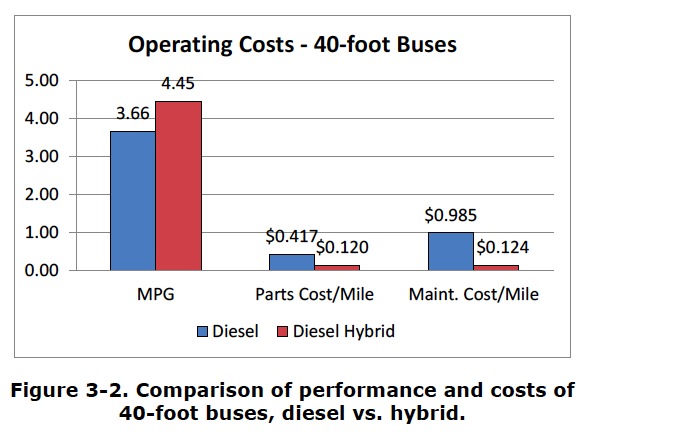NATIONAL CENTER FOR TRANSIT RESEARCH
Executive Summary
Florida transit agencies have been dealing with volatile fuel prices and changes in regulations regarding diesel engines and fuel. In addition, emphasis on reducing the overall consumption of fossil fuels has increased, as well as reducing carbon emissions by transit agencies. Florida transit agencies and funding entities continue to be under pressure to reduce operating costs and to run a more sustainable and environmentally friendly fleet in the urban environment. A popular strategy to pursue these goals has been the acquisition of alternatively fueled buses. However, higher reliance on alternative fuels has increased both capital and operating costs for some fixed route operators, and has created challenges for the widespread adoption of advanced transit technologies.
The Florida Department of Transportation (FDOT) is interested in collecting and analyzing up-to-date data on alternative fuel vehicle performance to assist the department with evaluating the benefits and investment costs in advanced transit technologies. The department engaged the Center for Urban Transportation Research (CUTR) at the University of South Florida (USF) in 2009 and again in 2012 to establish a reporting system for the collection of transit fleet performance and cost data. FDOT is interested in continuing regular data collection, monitoring, and evaluating field data on the performance and operating costs of alternative fuel transit vehicles nationwide. These data will keep the previously developed Bus Fuels Fleet Evaluation Tool (BuFFeT; © University of South Florida) life cycle cost model current and useful for decision makers considering investment in alternative fuel transit technologies.
CUTR sent data submission requests to all fixed route transit agencies in Florida. In addition, researchers reached out to the American Public Transportation Association’s (APTA) leadership and individual members for their advice and support with data collection from agencies outside of Florida. An attempt was made to collect data covering both fixed route and demand response transit vehicles. Unfortunately, regardless of the continued efforts to maintain regular data reporting, the response rate to these data requests was less than ideal.
Despite difficulties with data collection, CUTR obtained relevant operations and cost data for fixed route buses from eight Florida transit agencies reporting during 2013. However, the reporting was not always regular, with only five agencies providing fleet data almost every quarter of 2013. No data was available from transit agencies outside of Florida.
The data analysis for fixed route buses revealed that the vast majority of Florida’s transit buses are regular diesel vehicles (89 percent of the reported fleet), while only 11 percent are alternative fuel vehicles (diesel hybrids). More than 79 percent of the diesel buses are 40-foot buses, with 35-foot and 32-foot buses representing 6.8 percent and 6.3 percent of the diesel fleet, respectively. Alternative fuel buses, on the other hand, are more likely to be larger in size than diesel buses. Sixty-foot articulated buses represent 26.5 percent of diesel hybrid vehicles, while 40-foot buses account for 38.6 percent of the diesel hybrid fleet.
The analysis of fixed route data showed that alternative fuel buses have significantly higher acquisition costs but offer better fuel mileage than diesel buses. In addition, hybrid buses tend to have lower parts costs and maintenance costs per mile than comparable diesel buses. A 40-foot diesel hybrid bus has 21.6 percent better fuel economy (4.45 mpg for hybrid vs. 3.66 mpg for diesel), 71.2 percent lower parts cost per mile ($0.120/mile for hybrid vs. $0.417/mile for diesel), and 87.4 percent lower maintenance cost per mile ($0.124/mile for hybrid vs. $0.985 for diesel), compared to a regular diesel bus. At the same time, a 40-foot diesel hybrid bus costs 66.2 percent more to acquire than a comparable diesel bus.
The aggregate comparison of performance and maintenance costs of traditional diesel buses and hybrid buses operated by Florida fixed route agencies revealed that hybrid buses, regardless of vehicle size, have 21.0 percent better fuel economy, 66.2 percent lower parts cost per mile, and 72.2 percent lower maintenance cost per mile. However, hybrid buses on average cost 67.0 percent more to acquire than traditional diesel buses. The differential in performance can be attributed at least partially to the average age of the vehicles. An average diesel hybrid bus in the current analysis is 2.9 years old, compared to 8.4 years for an average diesel bus. Newer buses typically perform better and cost less to operate and maintain.
Download full version (PDF): Performance of Alternatively Fueled Buses
About the National Center for Transit Research
www.nctr.usf.edu
The National Center for Transit Research (NCTR) is located at the Center for Urban Transportation Research (CUTR) at the University of South Florida (USF). NCTR’s purpose is to make public transportation and alternative forms of transportation, including managed lanes, safe, effective, efficient, desirable, and secure.
Tags: FDOT, FL, Florida, Florida Department of Transportation, National Center for Transit Research, NCTR, University of South Florida, USF







 RSS Feed
RSS Feed